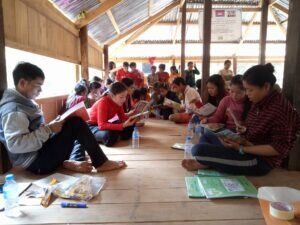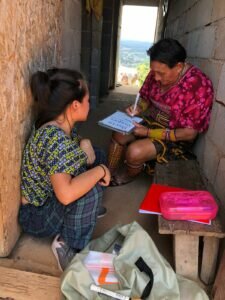Consider this: Of the estimated 7,000 languages spoken worldwide, only a few hundred are used in education systems and less than 100 are used in the digital world.
What does that mean?
According to the United Nations Educational, Scientific and Cultural Organization (UNESCO), that means 40% of the world’s population—or hundreds of millions of people—do not have access to an education in a language they speak or understand.
 At the same time, 43% of the world’s languages are at risk of dying out, taking with them, knowledge, traditions and cultures of entire groups of people.
At the same time, 43% of the world’s languages are at risk of dying out, taking with them, knowledge, traditions and cultures of entire groups of people.
We believe that by building learning experiences that are more inclusive of minorities and indigenous communities in their own languages, we not only start to empower the some of the most vulnerable populations, but we also sustainably preserve their heritage and traditional knowledge that make the world so special.
In line with UNESCO’s 2024 theme for International Mother Language Day, we are working with partners in different parts of the globe to develop and implement education models that support multilingual education. Through multilingual education, we begin the learning process within indigenous regions in the learners’ mother language. In doing so, we build a foundation for learning in a way that is comfortable for learners. But we also keep their cultural heritage alive by promoting intergenerational learning.
Once learners have achieved a basic education in their mother language, we can start to introduce additional, more mainstream, languages to continue their education and thrive.
How we are promoting multilingual education to build inclusive societies that value the participation and contributions of all citizens:
 In Panama, our partnership with the Lancôme Write Your Future initiative has allowed us to build a multilingual approach to improve the education of indigenous Guna women. We provide support and expertise to Coordinadora Nacional de Mujeres Indígenas de Panamá (CONAMUIP) to implement the Guna Women’s Literacy Program. Indigenous Guna women, taught by other bilingual Guna women, learn to read and write in Spanish using the Leamos digital platform. The program empowers the women as they gain Spanish literacy skills to themselves become teachers and deliver training to other women in the community. Projects like the Guna Women’s Literacy Program that build multilingual literacy open doors of access to children’s schools, health care, and entrepreneurship to improve their livelihoods.
In Panama, our partnership with the Lancôme Write Your Future initiative has allowed us to build a multilingual approach to improve the education of indigenous Guna women. We provide support and expertise to Coordinadora Nacional de Mujeres Indígenas de Panamá (CONAMUIP) to implement the Guna Women’s Literacy Program. Indigenous Guna women, taught by other bilingual Guna women, learn to read and write in Spanish using the Leamos digital platform. The program empowers the women as they gain Spanish literacy skills to themselves become teachers and deliver training to other women in the community. Projects like the Guna Women’s Literacy Program that build multilingual literacy open doors of access to children’s schools, health care, and entrepreneurship to improve their livelihoods.- We also support our partner Non-Timber Forest Products (NTFP) in Cambodia to empower and equip ethnic minorities to build a better future and livelihood. NTFP’s Kavet Bilingual Literacy Project teaches literacy in both the mother tongue and the national language. The project incorporates communities’ needs into the curriculum, and in 2020 was recognized by the Ministry of Education as being an outstanding success in the use of the Kavet language in the formal and non-formal education system.
- Building on our history, we are continuing the work of our founder Dr. Frank C. Laubach, who maybe more than anyone understood the importance of having access to educational materials in one’s mother language. Using his innovative Laubach Way to Reading methodology, Laubach developed literacy primers in 314 languages for which there were no existing materials. Each primer was created in partnership with an in-country team of educators to ensure that content and illustrations were culturally adapted and designed for local learners. Today, we are working to digitize the Laubach printed primers to safeguard these materials and keep several world languages alive, in use, and accessible to organizations and individuals. Currently our digital library offers more than 40 primers in languages such as Arabic, Hindi, Oriya, Santali, Tamil, Kapauku, Kikuyu, KiSwahili, Maasai, Kamba, Amharic, Tshiluba, Pashto, Igbo, Hausa, Yoruba, Navajo, and many more. Member organizations can access these materials through ProLiteracy Education Network.
We will continue to promote mother tongue education worldwide because we believe in the right to education and that education is the backbone of safe and equitable societies.